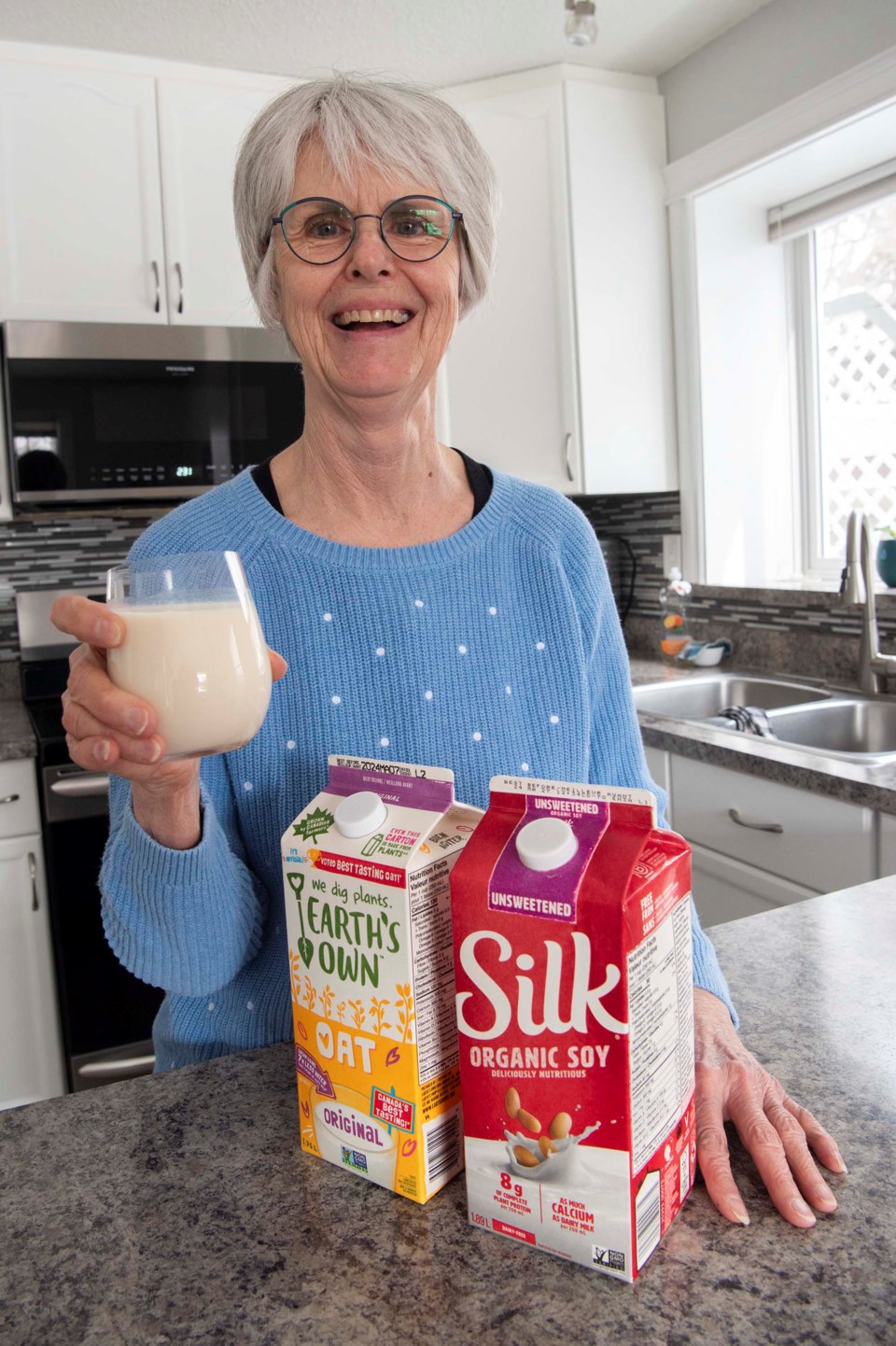How Now Green Cow
How Now Green Cow is examining how global heating how our dinners are shaping, and are being shaped by, the climate crisis. Got a food and climate question? Send it to [email protected] so it can be addressed in a future story.
St. Albert resident Chris Albrecht used to get her milk from a cow.
Eight years ago, after struggling with her health and weight, she and her husband Wayne switched to a plant-based diet. Nowadays, she gets her milk from oats and soybeans.
“I love my food now,” said Albrecht, as she no longer has to worry about fat or calories or animal welfare.
“I love my food, and I enjoy it more than I ever enjoyed food before.”
Albrecht, who lives in a solar-powered home in Woodlands, is one of a growing number of Canadians who have ditched cow’s milk for plant-based alternatives. Research suggests doing so can help the environment, but could harm your health unless done with caution.
Greener milk
Milk accounts for about 30 per cent of all heat-trapping pollution from livestock (specifically cattle, chickens, pigs, goats, buffalo, and sheep), the UN’s Food and Agriculture Organization estimates. This works out to about 1.86 gigatonnes a year, or about 2.8 times what Canada emitted in 2021.
Plant-based milks significantly outperform cow’s milk on most environmental metrics, wrote Hannah Ritchie, science outreach lead for Our World in Data. Producing a litre of cow’s milk requires about nine square metres of land and 628 litres of water, and creates about three kilograms of heat-trapping pollution — about three times more pollution, 10 times more land, and two-to-20 times more water than is needed and released to make a litre of oat, soy, rice, or almond milk. Plant-based milks also cause significantly less eutrophication.
“If you want to reduce the environmental footprint of your diet, switching to plant-based alternatives is a good option,” Ritchie wrote.
Cow’s milk has an outsized environmental footprint because of the cows that make it, said David Suzuki Foundation spokesperson Becca Kram, who has researched plant-based milks.
“Cows are notorious for emitting methane, which is responsible for about a quarter of global warming emissions,” she said, and produce a lot of water-polluting manure.
You also need a lot of land, water, and fertilizer to grow feed for cows, which on the Prairies eats into wetlands and forests, Kram said.
Plant-based milks aren’t all equally green, Kram said. Almond milk requires more water than soy, oat, cashew, or coconut milk, for example, which is problematic, as most commercial almonds come from drought-and-fire-wracked California. Soy, cashew, and coconut production are associated with deforestation, while oats require fertilizer and pesticides.
“Oat milk is the leader in most categories,” Kram said, requiring about 60 per cent less energy, 80 per cent less land, and producing 80 per cent less heat-trapping pollution compared to cow’s milk.
Cost and health
Plant-based milk costs slightly more than ordinary milk, a brief Gazette search suggests. As of March 28, the regular price of Silk-brand oat, soy, cashew, and coconut milks at the St. Albert Village Landing Save On Foods was six to 12 cents more per 100 mL ($0.28 to $0.34/100 mL) than Dairyland two per cent cow’s milk ($0.22/100 mL for a 2 L jug).
Kram said oat milk made in your home is probably the most cost-effective plant-based beverage in Alberta, as oats are cheap.
“All you need is a blender,” she said.
Unfortified plant-based milks tend to have less fat, protein, calcium, calories, and vitamin D than regular milk, said Christie Peregrymn, a registered dietitian based in Sherwood Park. While this isn’t usually an issue for adults with balanced diets, this can be a problem for children, who need lots of these nutrients for proper growth.
Peregrymn said anyone who switches to plant-based milk should pick one fortified with vitamin D and calcium to avoid health problems. They should also seek out a plant-based milk with nutritional content similar to cow’s milk: at least six grams of protein, less than 15 grams of sugar, about 300 mg of calcium, and around 80 IUs of vitamin D per cup.
Albrecht said there are any number of reasons to give plant-based milk a try, including for your health, the environment, and animal welfare. She suggests trying a few unsweetened beverages with cereal to see which one you like. (She drinks oat and soy milk fortified with calcium and vitamin D nowadays.)
“The dairy shelves are full of plant-based milks now,” she said, and which you drink is largely a matter of personal preference.




